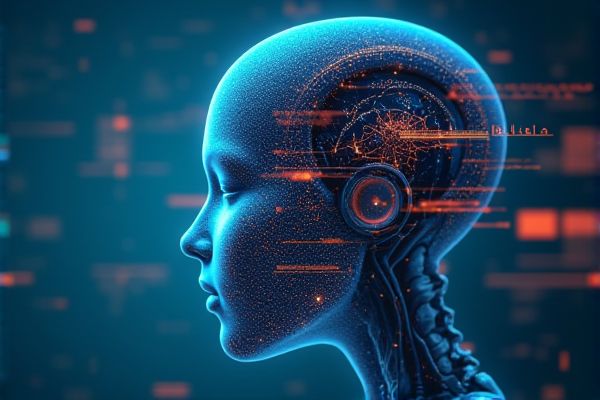
AI enhances diagnostic accuracy by analyzing vast amounts of patient data and identifying patterns that may be missed by human practitioners. It assists in personalized treatment plans by considering genetic information, medical history, and lifestyle factors to tailor therapies for individual patients. Predictive analytics powered by AI helps healthcare providers anticipate patient needs and optimize resource allocation, ultimately improving patient outcomes. Remote monitoring technologies, utilizing AI, enable real-time health tracking, empowering patients to take charge of their well-being.
AI usage in healthcare systems
Diagnostic Accuracy Enhancement
AI technology in healthcare systems has the potential to significantly enhance diagnostic accuracy. For example, machine learning algorithms can analyze medical imaging data, enabling quicker and more precise identification of conditions such as cancer. These improvements may lead to better patient outcomes and optimized treatment plans. The integration of AI tools in institutions like hospitals could streamline diagnosis processes and reduce the likelihood of human error.
Predictive Analytics for Patient Outcomes
Predictive analytics in healthcare systems can enhance patient outcomes by analyzing vast amounts of data to identify trends and risks. For example, a hospital using advanced algorithms may predict which patients are at higher risk of readmission. These insights can lead to targeted interventions, potentially reducing healthcare costs and improving overall patient care. The possibility of leveraging AI for predictive analytics offers significant advantages in terms of efficiency and effectiveness in clinical decision-making.
Personalized Treatment Plans
AI can analyze large volumes of patient data to identify trends that may lead to more effective personalized treatment plans. With machine learning algorithms, healthcare providers at institutions like Mayo Clinic can tailor interventions based on individual patient characteristics, improving outcomes. The potential for AI to predict treatment responses offers a chance to enhance patient care significantly. This technology may also streamline operations, allowing clinicians to focus on more complex cases.
Remote Patient Monitoring
AI usage in healthcare systems can enhance Remote Patient Monitoring by enabling real-time data analysis and predictive analytics. This approach may improve patient outcomes by allowing for timely interventions based on health trends observed through wearable devices. For example, institutions like Mayo Clinic are exploring AI to streamline patient management and personalize care. The potential for reduced hospital readmissions through continuous monitoring presents a significant advantage for both patients and healthcare providers.
Clinical Workflow Optimization
AI has the potential to enhance clinical workflow optimization in healthcare systems by streamlining administrative tasks. For example, tools like electronic health record (EHR) systems can leverage AI to reduce time spent on data entry and patient scheduling. This can lead to increased efficiency and allow healthcare professionals to focus more on patient care. The integration of AI-driven analytics can also improve decision-making, as seen in institutions that utilize predictive models for patient outcomes.
Drug Discovery and Development
AI has the potential to significantly enhance healthcare systems by improving diagnostic accuracy and treatment personalization. In drug discovery and development, AI can streamline the identification of potential compounds, reducing time and costs associated with research. For example, institutions like DeepMind are leveraging machine learning techniques to predict protein structures, which can expedite the discovery process. This integration of AI technologies may lead to more effective therapies and better patient outcomes in the long run.
Medical Imaging Interpretation
AI usage in healthcare systems can enhance the accuracy of medical imaging interpretation by analyzing large datasets for patterns. For instance, platforms like IBM Watson can assist radiologists in detecting anomalies in MRI scans with higher precision. The potential for reducing diagnostic errors may improve patient outcomes and streamline workflow efficiency. Implementing AI tools could also enable healthcare facilities to allocate resources more effectively, leading to cost savings.
Natural Language Processing for EHRs
AI usage in healthcare systems can enhance the efficiency of patient care by streamlining Electronic Health Records (EHRs). Natural Language Processing (NLP) can analyze unstructured data within these records, improving clinical decision-making. This technology has the potential to reduce errors and free up time for healthcare providers, allowing them to focus more on patient interaction. For instance, institutions like Mayo Clinic are exploring NLP applications to gain insights from patient data more effectively.
AI-driven Telemedicine Solutions
AI-driven telemedicine solutions can enhance patient diagnosis and treatment efficiency. For example, AI algorithms analyze patient data to provide personalized care recommendations, potentially improving outcomes. The integration of such technologies in institutions like the Mayo Clinic may lead to reduced wait times and increased access to specialists. There is a chance that broader implementation of AI in telemedicine could streamline healthcare delivery and optimize resource allocation.
Automated Administrative Tasks
AI can enhance efficiency in healthcare systems by automating administrative tasks, reducing human error and improving patient data management. For instance, the implementation of AI in hospitals can streamline patient scheduling and billing processes, leading to more timely care delivery. This automation allows healthcare professionals to focus more on patient interactions and clinical duties. The potential for increased operational efficiency presents a significant advantage for institutions like Cleveland Clinic.
 techknowy.com
techknowy.com